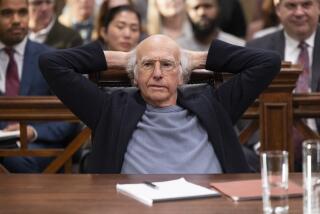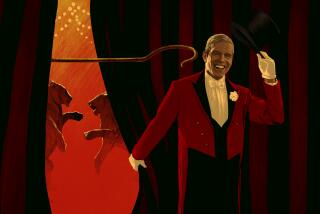When TV characters get whacked
The courtroom battle between former “Desperate Housewives” costar Nicollette Sheridan and the show’s creator, Marc Cherry, over the circumstances of her character’s demise is another reminder that for an actor, the only thing worse than not getting a part on a show is getting killed off a show.
“It’s a one-way contract, they can drop you at any time,” said Steve Schirripa, who spent seven years nervously pawing through the pages of scripts for “The Sopranos” wondering if this was the episode where his character would get whacked.
Producers tend to try to keep the lid on such dramatic events so stories don’t leak out to the gossip pages and the actors don’t subconsciously alter their performances knowing the end is near. Schirripa, who played Bobby “Bacala” Baccalieri on the HBO series — bodyguard to Tony Soprano’s Uncle Junior — got the word he was on the way out only 10 days before the episode was scheduled to shoot.
RECENT TV DEATHS: ‘Desperate Housewives’ and ‘Walking Dead’: Fans react to deaths
“We would ask the writers, ‘I’m thinking about buying an apartment, you have to let me know,’” Schirripa said. “You could never get an answer out of them.”
Writers and producers often go to great lengths to disguise their intentions and keep information on a need-to-know basis. In the case of “Desperate Housewives,” the episode in which Sheridan’s character was killed by her husband wasn’t titled “The One Where We Get Rid of Edie.” Instead, creator Marc Cherry referred to the plot as “Steven drinks OJ,” a reference to O.J. Simpson.
Characters die for lots of reasons, some having nothing to do with the plot of a show. “MASH” costar McLean Stevenson wanted off the show after its third season, even though his contract was not up, because he felt there was too much focus on Alan Alda’s character, Hawkeye, and was no longer a true ensemble comedy. The writers responded by having his character, Lt. Col. Henry Blake, shipped home — then killed in a plane crash, ensuring that he could not be brought back to the show.
More recently, “Two and a Half Men” co-creator Chuck Lorre had star Charlie Sheen bumped off the hit CBS sitcom by having his character run over by a subway train. Production had to be shut down so Sheen could seek help with substance-abuse issues. After Sheen ripped Lorre publicly, he was fired.
Economic issues can also factor into getting rid of an actor. The longer a show stays on, the higher the stars’ salaries. Sometimes a character is bumped off to help the show meet its budget.
Often times, producers are able to resist such forced changes. That was the case with AMC’s “Mad Men.” The network wanted to lower the cost on the show not only by shortening the episodes to fit in more commercials but also by reducing the large ensemble case. Creator Matt Weiner refused, and AMC ultimately relaxed some of its demands.
All these factors can create tense actors. On “The Sopranos,” death came for the actors who played title character Tony Soprano’s closest associates, best friends and most trusted capos.
“It was a seriously stressful set,” Schirripa said, who now plays a father on ABC Family’s “The Secret Life of the American Teenager” and is host of “Nothing Personal,” a reality show, on Investigation Discovery, about gangland murders.
To lessen the blow, Schirripa says, the cast would always throw a party for the actor whose character was getting bumped off, held at the Little Italy landmark restaurant Il Cortile.
Schirripa’s character made it all the way to the last “Sopranos” season and the second-to-last episode. When his time came, the show’s creator, David Chase, actually paid a visit to his home to deliver the bad news. “I guess you know why I’m here,” Chase told Schirripa. “It was a real hit.”
At least Bacala had a memorable death scene: The electric train enthusiast was gunned down in a toy store.
“The worst is when they don’t even kill you on camera,” Schirripa said. “When it’s just a funeral scene that means they wanted you out of there and you’re not in good standing.”
More to Read
The biggest entertainment stories
Get our big stories about Hollywood, film, television, music, arts, culture and more right in your inbox as soon as they publish.
You may occasionally receive promotional content from the Los Angeles Times.







